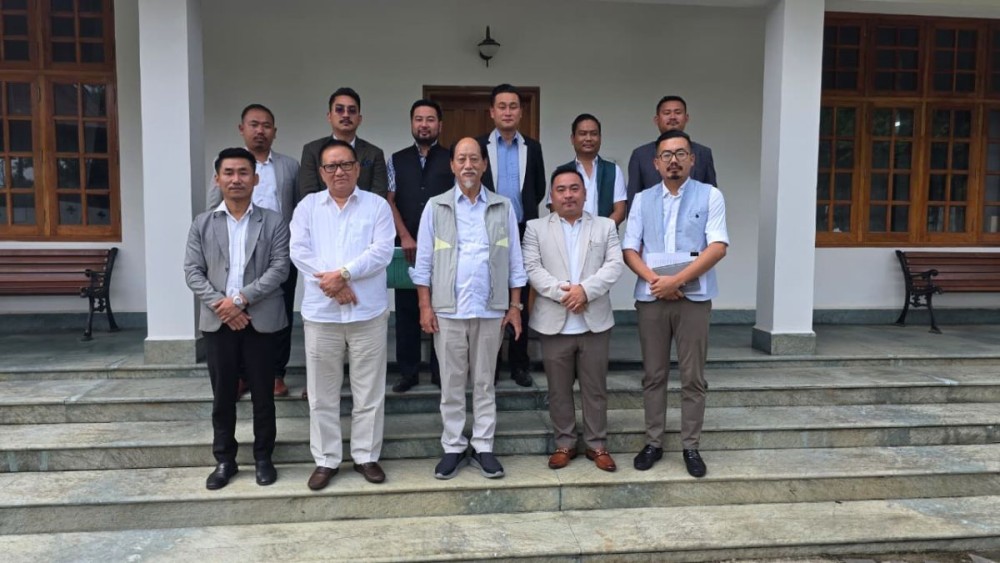NSF officials with Chief Minister of Nagaland Neiphiu Rio and Deputy CM TR Zeliang.

KOHIMA, OCTOBER 9 (MExN): The Naga Students’ Federation (NSF) has submitted a detailed memorandum to the Chief Minister of Nagaland outlining a series of urgent issues concerning the political, social, and developmental interests of the Naga people.
In the memorandum, the NSF reaffirmed that the Indo-Naga political issue “is not merely a political discourse but the very foundation of our existence as a people.” While acknowledging the government’s formation of the Core Committee on the Naga Political Issue, it urged the state to “rise above symbolic gestures” and work “with utmost sincerity and courage.”
The Federation called on the government to ensure inclusivity of all Nagas across artificial boundaries, advocate for integration of all Naga territories, and facilitate political dialogue “at the highest level without preconditions.” It stated that the Chief Minister must take a “proactive and decisive” role in this matter.
‘Influx of illegal immigrants’
Terming the ‘influx of illegal immigrants’ as “an existential threat,” the NSF criticised poor implementation of the Inner Line Pass (ILP) system, which it said “has left loopholes for outsiders to infiltrate, settle and slowly displace indigenous communities.”
It informed that the Federation had set up the Inner Line Regulation Commission (ILRC) in December 2024 and urged the government to establish a special commission for Inner Line Regulation, create a centralized database for ILP, and open ILP issuing offices and checkpoints at Dimapur Railway Station and Airport.
It also called for ILP enforcement wings in all districts, regular sensitization programs, and closer coordination with village councils and civil bodies “to prevent illegal settlement.”
Illegal Appointments
The Federation expressed deep concern over the “cancerous problem” of backdoor appointments in state departments, alleging that such practices destroy transparency and discourage merit.
Despite the establishment of the NPSC and NSSB, the NSF claimed that illegal appointments continue and demanded that the government immediately halt such practices, ensure all recruitments are conducted through NPSC or NSSB, and “fix accountability upon officials indulging in these practices.”
Khelhoshe Polytechnic
Pointing out the absence of a full-fledged government engineering college in Nagaland, the NSF urged the state government to upgrade Khelhoshe Polytechnic Atoizu (KPA) into a full-fledged Government Engineering College beginning from the 2026-2027 academic year.
It stated that such an initiative would “foster self-reliance in technical fields and reduce dependence on external institutions.”
Indigenous Representation
The Federation voiced concern over the lack of indigenous representation in Nagaland University and the National Institute of Technology (NIT), Chümoukedima.
It demanded that “at least 80% of positions in Nagaland University and NIT be reserved for indigenous Nagas of the State,” citing Article 371(A) as a constitutional safeguard recognizing the rights of the Naga people.
The memorandum argued that such representation would ensure long-term commitment, improve administration, and address the growing unemployment crisis among qualified Naga youth.
Transparency
Highlighting corruption and inefficiency in administration, the NSF urged the government to strengthen e-Governance mechanisms for transparency and accountability.
It called for compliance with the Government of India’s Guidelines for Indian Government Websites (GIGW), expansion of digital platforms to enhance interaction between citizens and government, and the use of internet and mobile technologies to make services accessible, especially in rural areas.
“Such steps will not only build public trust but also set Nagaland on the path of transparent governance,” the NSF noted.
Self-Reliance
Citing rising unemployment, the Federation proposed that each of the 60 legislators sponsor aspirants from their constituencies for UPSC coaching and mentorship. It also urged strengthening of vocational training and skill development initiatives, and the intensive implementation of the Chief Minister’s Micro Finance Initiative to promote youth entrepreneurship.
Repeal of AFSPA
Describing the Armed Forces (Special Powers) Act (AFSPA) as “draconian,” the NSF stated that it has “inflicted untold suffering, human rights violations, and trauma upon generations of Nagas.”
The Federation reaffirmed its non-cooperation movement with the Indian Armed Forces until AFSPA is repealed and urged the state government to amplify this demand “in every possible forum.”
FMR
The NSF condemned the Central Government’s decision to abolish the Free Movement Regime (FMR) and introduce border fencing along the Indo-Myanmar border, calling it a policy that “disregards the unique history of the Nagas” and threatens centuries-old kinship and cultural ties.
It appealed to the state government to oppose these “regressive moves” and to advocate for policies that respect traditional cross-border relations.
NSF President Mteisuding and General Secretary Kenilo Kent stated that the issues presented “are not merely student-related grievances but existential, political and developmental concerns that directly impact the future of the Naga people.”
They expressed the Federation’s assurance of cooperation with the government “in pursuing justice, transparency and holistic development” and hope that in the CM’s leadership, “our people will take bold steps towards peace, accountability and progress.”






